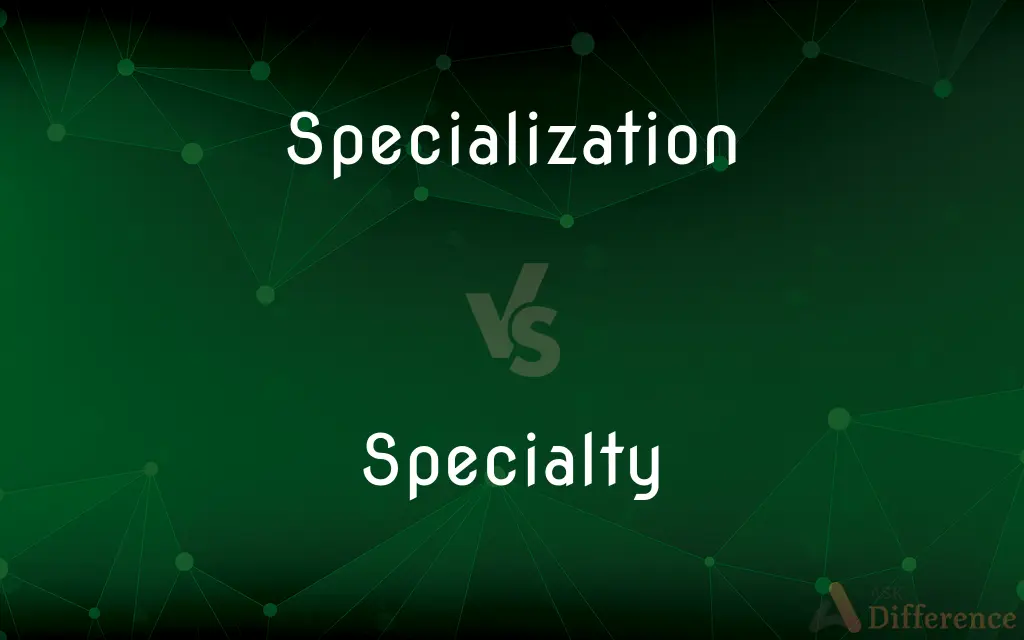Specialization vs. Specialty — What's the Difference?
Edited by Tayyaba Rehman — By Maham Liaqat — Updated on April 22, 2024
Specialization refers to the process of focusing on a specific area of expertise, while specialty is the specific area itself or a product/service known for its distinctiveness.

Difference Between Specialization and Specialty
Table of Contents
ADVERTISEMENT
Key Differences
Specialization involves dedicating oneself to a particular branch of study or profession, focusing deeply on that area to gain expert knowledge and skills. On the other hand, a specialty can refer to both the area of expertise achieved through specialization and a product or service that is distinct because of unique qualities.
In academic and career contexts, specialization often requires extensive education and training in a narrow field. Whereas, a specialty, especially when referred to in medical or professional fields, represents the specific focus or services offered that distinguish one professional from another.
The act of specializing is dynamic, involving ongoing learning and adaptation within a chosen field. In contrast, a specialty is typically static, defined by established standards or attributes that are recognized and valued in the marketplace or community.
Businesses also engage in specialization by focusing their efforts on a particular market niche or production process to maximize efficiency and expertise. Meanwhile, they might offer a specialty product that is notable for its unique characteristics or superior quality compared to general offerings.
In education, students might choose a specialization in their studies, such as neural networks in computer science, which requires deep focus and understanding of that particular area. Specialty, in this sense, could be seen in the resulting expertise or in specific courses designed to impart deep knowledge in a narrowly defined field.
ADVERTISEMENT
Comparison Chart
Definition
The process of focusing on a specific area of expertise
A distinct area of expertise or unique product
Context
Academic, professional
Medical, academic, business
Outcome
Deep expertise and knowledge
Unique service or product
Nature
Dynamic, involving continuous learning
Static, based on established qualities
Purpose
To gain proficiency and narrow expertise
To offer or be known for something unique
Compare with Definitions
Specialization
Specialization can lead to increased job opportunities in specific sectors.
Specialization in digital marketing is highly demanded in the tech industry.
Specialty
Can be a focus area developed through personal or professional interest.
Her specialty in landscape photography is well-known.
Specialization
Often necessitates collaboration across various specialized individuals.
The project was successful due to the specialization of each team member.
Specialty
Often synonymous with craftsmanship or high-quality output.
The carpenter’s specialty is handcrafted wooden furniture.
Specialization
Specialization is the pursuit of a focused area within a broader field.
She pursued a specialization in pediatric oncology.
Specialty
It refers to services or products that stand out due to distinct characteristics.
This clinic’s specialty is sports medicine.
Specialization
It requires ongoing education and skill enhancement.
Specialization in software engineering requires keeping up with the latest programming languages.
Specialty
A specialty is a recognized area of expertise or an outstanding product.
French pastry is his specialty in the culinary world.
Specialization
It often involves tailoring education or professional development towards a niche.
His specialization in Byzantine history makes him a sought-after expert.
Specialty
It may define a business’s or individual’s brand identity.
Specialty coffees have become the cornerstone of their café’s success.
Specialization
The act of specializing or the process of becoming specialized.
Specialty
A special pursuit, occupation, aptitude, or skill
The professor's specialty was the study of ancient languages.
Specialization
Adaptation, as of an organ or a species, to a specific function or environment.
Specialty
A branch of medicine or surgery, such as cardiology or neurosurgery, in which a physician specializes; the field or practice of a specialist.
Specialization
A character or feature resulting from such adaptation.
Specialty
An item or product of a distinctive kind or of particular superiority
French pastry is the chef's specialty.
Specialization
The act or process of specializing.
Specialty
(Law) A contract or agreement that creates a greater obligation than an ordinary contract or agreement because it is executed under seal.
Specialization
The area in which someone specializes.
Specialty
That in which one specializes; a chosen expertise or talent.
They cook well overall, but their true specialty is pasta.
Specialization
(biology) The adaptation of an organism to a specific environment, or adaptation of an organ to a particular function.
Specialty
A product that originates in and is characteristic of a place.
Specialization
(mathematics) A proof, axiom, problem, or definition whose cases are completely covered by another, broader concept.
A triangle is a specialization of a polygon to one with exactly three sides.
Specialty
(obsolete) Particularity.
Specialization
The act of specializing, or the state of being spezialized.
Specialty
A particular or peculiar case.
Specialization
The setting apart of a particular organ for the performance of a particular function.
Specialty
An attribute or quality peculiar to a species.
Specialization
The act of specializing; making something suitable for a special purpose
Specialty
(legal) A contract or obligation under seal; a contract by deed; a writing, under seal, given as security for a debt particularly specified.
Specialization
The special line of work you have adopted as your career;
His specialization is gastroenterology
Specialty
Particularity.
Specialty of rule hath been neglected.
Specialization
(biology) the structural adaptation of some body part for a particular function;
Cell differentiation in the developing embryo
Specialty
A particular or peculiar case.
Specialty
A contract or obligation under seal; a contract by deed; a writing, under seal, given as security for a debt particularly specified.
Let specialties be therefore drawn between us.
Specialty
That for which a person is distinguished, in which he is specially versed, or which he makes an object of special attention; a speciality.
Men of boundless knowledge, like Humbold, must have had once their specialty, their pet subject.
Specialty
An asset of special worth or utility;
Cooking is his forte
Specialty
A distinguishing trait
Specialty
The special line of work you have adopted as your career;
His specialization is gastroenterology
Common Curiosities
Can a person have more than one specialty?
Yes, individuals can have multiple specialties, especially if they have diverse interests or have pursued different areas of expertise throughout their careers.
How does one choose a specialty?
Choosing a specialty usually involves considering personal interests, market demand, and the potential for professional growth and satisfaction.
What role does specialization play in academic research?
In academic research, specialization allows scholars to focus deeply on a narrow topic, contributing to advanced knowledge and innovations in that specific area.
Are there disadvantages to specialization?
Over-specialization can limit flexibility and opportunities in broader or rapidly changing markets and may lead to challenges if the specialized skill becomes less relevant.
What is the difference between a subspecialty and a specialty?
A subspecialty is a narrower focus area within a specialty, often requiring additional expertise and training.
How do businesses decide on a specialty product?
Businesses often choose specialty products based on market research, unique competencies, and the potential to meet specific customer needs that are not addressed by mainstream products.
Is specialization necessary in every profession?
Not necessarily; some professions benefit more from a broad skill set, but in fields like medicine or technology, specialization is often essential.
How do educational institutions support specialization?
Educational institutions offer specialized courses, degrees, and resources to support students in gaining deep knowledge and skills in specific fields.
How does specialization affect innovation?
Specialization can drive innovation by allowing individuals to develop highly refined skills and insights, leading to breakthroughs within specific areas.
Can specialization lead to higher income?
Typically, yes, as specialized skills are often in lower supply and higher demand, potentially leading to higher income opportunities.
Is it possible to switch specialties?
Yes, though it may require additional training or education, professionals can switch specialties based on changing interests or market conditions.
What are the trends in specialization in the tech industry?
Current trends include specialization in cybersecurity, artificial intelligence, and cloud computing, reflecting the growing importance of these areas.
How is a specialty recognized in professional communities?
A specialty is often recognized through certifications, professional society memberships, and peer recognition within the field.
What impact does specialization have on professional networks?
Specialization can help professionals build stronger networks with peers in the same field, enhancing collaboration and opportunities.
Does having a specialty guarantee professional success?
While a specialty can enhance opportunities and recognition, professional success also depends on factors like market demand, continual learning, and adaptability.
Share Your Discovery

Previous Comparison
Rill vs. Rivulet
Next Comparison
Several vs. SomeAuthor Spotlight
Written by
Maham LiaqatEdited by
Tayyaba RehmanTayyaba Rehman is a distinguished writer, currently serving as a primary contributor to askdifference.com. As a researcher in semantics and etymology, Tayyaba's passion for the complexity of languages and their distinctions has found a perfect home on the platform. Tayyaba delves into the intricacies of language, distinguishing between commonly confused words and phrases, thereby providing clarity for readers worldwide.















































